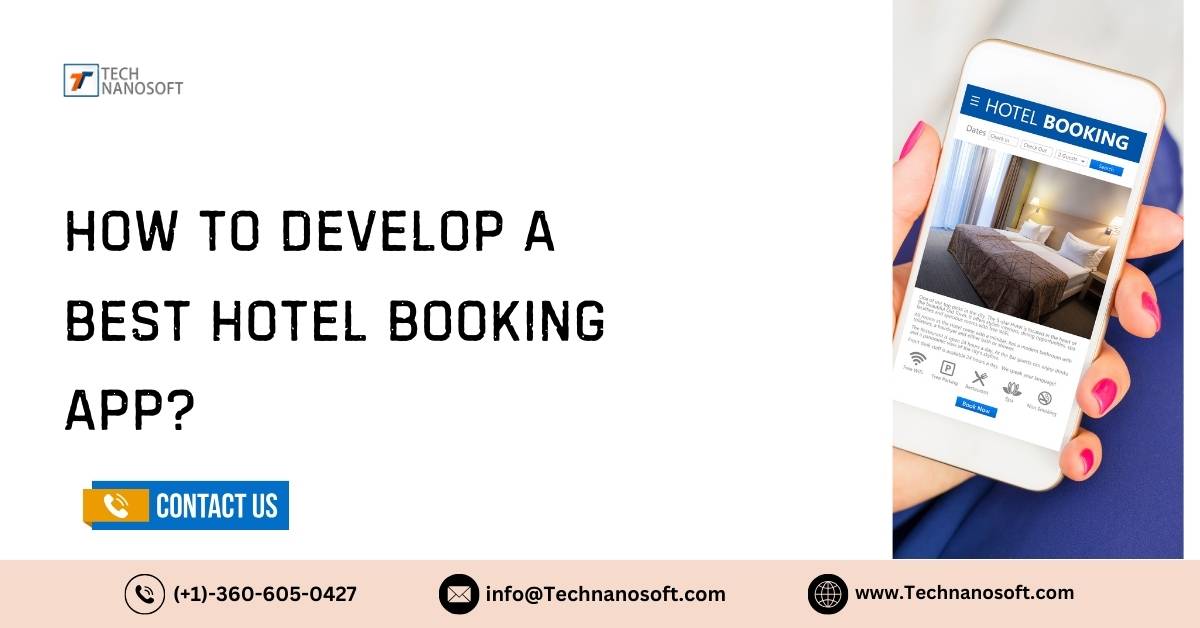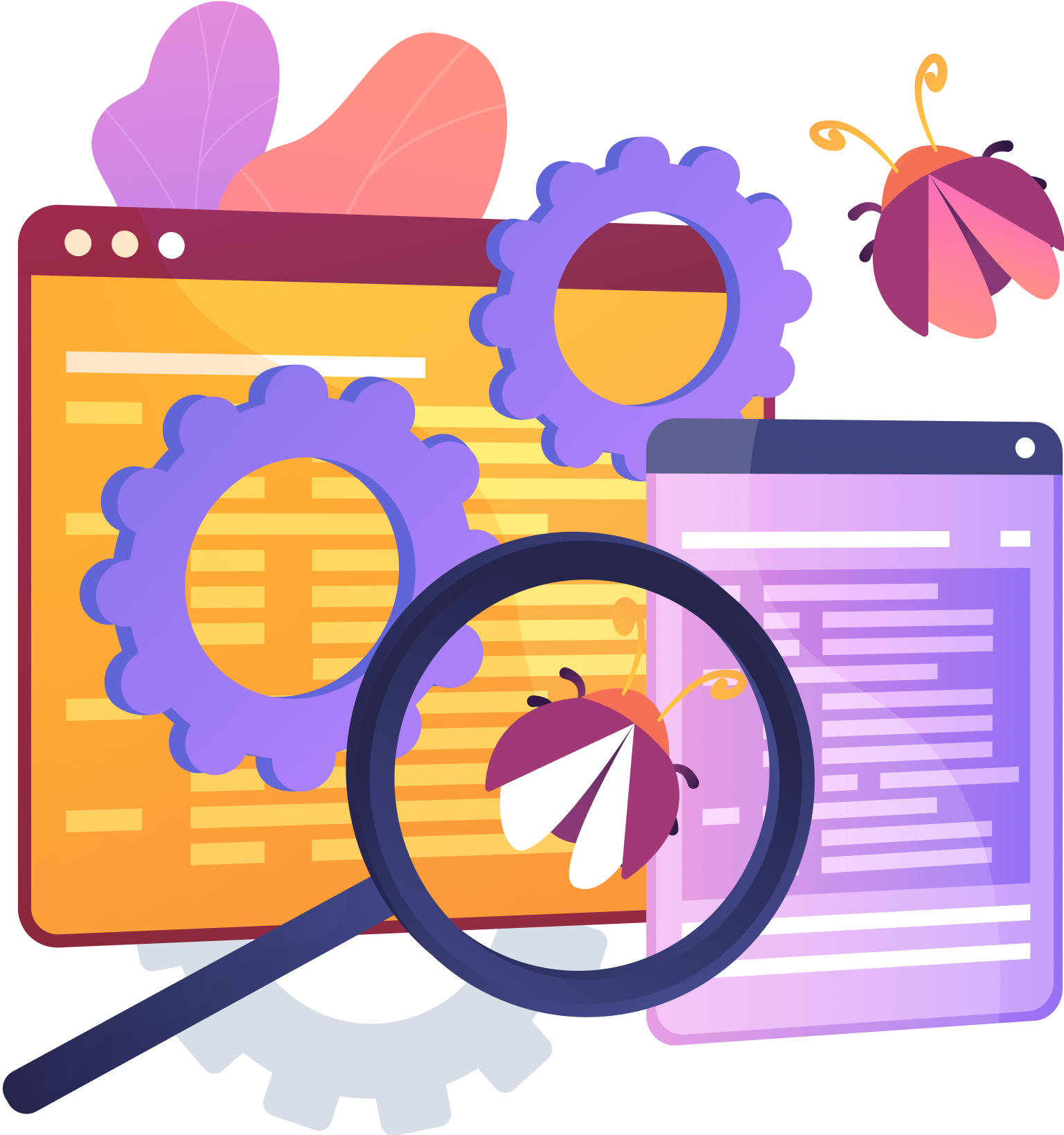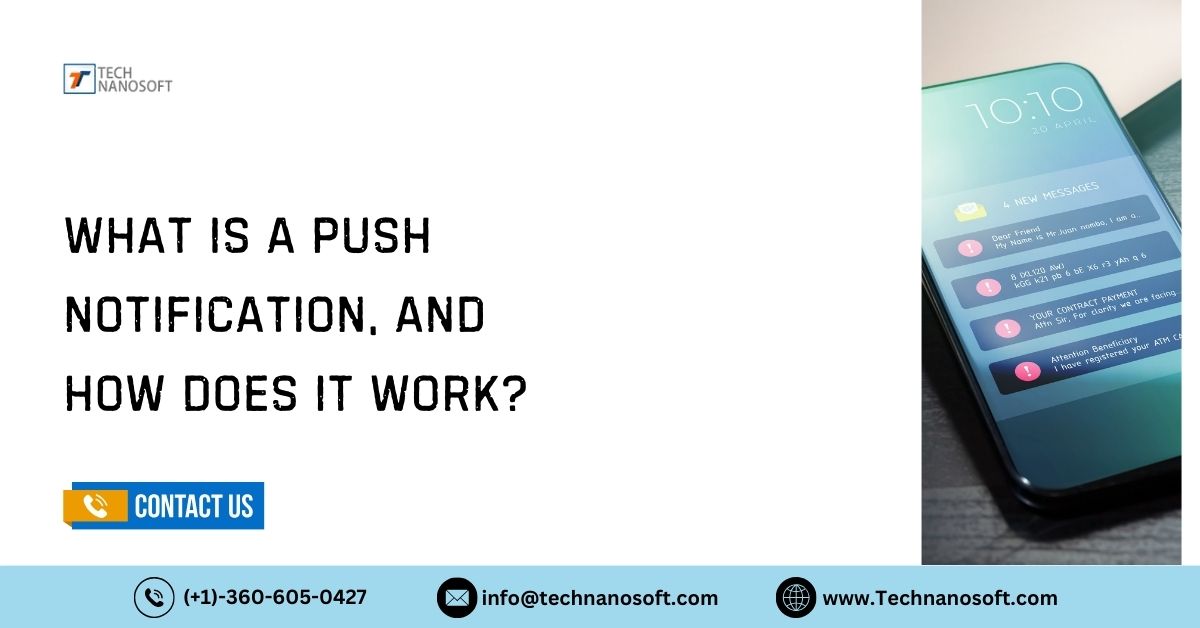How To Develop a Best Hotel Booking App?

In this digital age, travelers value ease of use and customized encounters over anything else. A unique hotel booking app isn't just a tool. Also a way to keep customers coming back.
This article helps you understand for hotel booking app development, and how much it will cost. It covers everything from the initial idea to launching your app.
Learn about the technologies behind these apps, reasons to create your own, and key features that enhance user experience. Accept new ideas to make a platform that not only meets but also exceeds the needs of modern tourists.
What is Hotel Booking App Development?
Hotel booking app development involves creating mobile apps that help users easily find, book, and manage hotel rooms online. It uses various technologies like React Native, Flutter, Node.js, MongoDB, and third-party APIs for payment and maps to create a complete system.
Developers create easy-to-use interfaces for smooth navigation. They create strong back-ends for things like updating bookings in real-time, processing payments, and sending SMS notifications. The goal is to make an app that is safe, quick to respond, and full of useful features that improve the user experience, help hotels run more smoothly, and help the hospitality industry grow.
How Much Does Hotel Booking App Development Cost?
The cost of making a hotel booking app can range from $8,000 to over $100,000, based on your needs and the features you want. A simple app with the most important features for one device (iOS or Android) costs at least $8,000. The cost of creation goes up for advanced features like real-time deals or deep integrations.
It takes twice as much work and costs twice as much to develop both systems. Whether to hire in-house coders or freelancers also affects costs. To get a competitive price, write down the features you want your app to have and get quotes from reputable app developers.
REMEMBER- The hotel booking app development changes interactions with the world by making things better and faster. While developing hotel booking app, it's important to take advice from experts. They create assessments that align with your project wants and goals.
Types of Hotel Booking Applications
Luxury Hotel App
The luxury hotel app is for travelers who are choosy and want to stay in top hotel locations. They can enjoy gourmet food, spa treatments, and personalized help from a butler.
Luxury hotel apps want to give customers great experiences. They do this by making booking easy and providing detailed room information. The apps also offer virtual tours that show off luxurious settings and amenities. To keep guests pleased and coming back, they often combine reward programs with special deals.
Hotel Chain App
Hotels apps make book hotel room online across a brand's sites easier. They offer consistent service, rewards for regular customers, and membership benefits for people who come back often. With unified booking platforms, users can easily book, get access to special deals, and handle bookings in multiple places. These apps make it easier for people to recognize the chain's name and keep coming back.
Last-Minute Hotel Booking App
Last-minute hotel booking apps offer lower prices for instant stays, aimed at travelers who plan their trips at the last minute. They use current price and availability information to help people book accommodations for the same day or the next day. These apps focus on making things simple and cheap. Usually, these apps have simple screens for quick bookings and let you cancel instantly if there are travel problems.
Cheap Hotels App
The cheapest hotel booking app offers affordable lodging with all the necessary amenities for budget-conscious tourists. They assembled listings from cheap lodgings that show competitive prices, information about the area, and user reviews. These apps focus on value and cost, giving users the ability to narrow down their choices by price range, amenities, and guest reviews to find options that are right for them and their budget.
Travel App
Travel apps offer a wide range of travel services, like booking flights, renting cars, and staying at hotels, all in one place. They offer itinerary management, location guides, and real-time updates on travel-related information to people who want to plan their trips quickly and easily. These apps simplify travel planning, from flight booking to navigation. By combining travel options in one app, users can have better experiences.
Hotel Consolidator App
Hotel consolidator apps combine different accommodations in one place. They help tourists find and book hotel rooms from various online sources. These apps connect users with a wide range of lodging options.
It provide affordable rates at a variety of hotels, ranging from small, independent establishments to large, international chains. These apps focus on giving you options and making things easy. Apps have search, reviews, and booking tools to make planning faster and more enjoyable.
In-Advance Hotel Booking App
People who enjoy planning ahead and staying organized can benefit from using hotel booking apps. These apps allow users to book rooms well in advance of their trips. This can help ensure they have accommodations secured for their travels. By using these apps, individuals can have peace of mind knowing they are taking care of their lodging.
Room booking app have benefits like discounts for booking early, the ability to choose your own rooms, and features for managing your schedule. They help people find available rooms without needing to book ahead of time, making trip planning and preparation simpler.
READ ALSO- How Much Does Website Development Cost?
Features For Developing The Best Hotel Booking App
Search and Filters: Your search or filter can lead you to a hotel list. Users can search and sort list hotels with features such as hotel prices, hotels available, best rooms near me, hotel rates, hotel deals, and amenities. Detailed listings with pictures and descriptions help users make choices based on their budget and preferences, making sure they have a personalized booking experience.
Booking and Canceling Hotel Rooms: It simplifies booking and provides options for flexible room cancellations. Integration with calendars makes sure that users and hotels are always up to date on which rooms are available, which makes the booking process better for everyone.
Notifications and Alerts: The system sends immediate alerts and confirmations for bookings, special deals, and changes to hotel availability. It provides users with real-time updates, encouraging increased interaction and expediting the handling of booking-related information.
Hotel and Customer Accounts: It offers personalized profiles tailored to the needs of both hotels and clients. It keeps track of past bookings, preferences, and information about reward programs. It lets you provide personalized service, build long-lasting relationships with customers, and run your hotel more efficiently.
Payment Gateway: Encrypted channels ensure that booking payments processed safely. Users can choose from a variety of payment methods, and the booking process safeguards sensitive financial information.
Travel Guide: It provides comprehensive destination guides that include details on local sights, weather, transportation options, and travel tips. It enhances travel planning by providing valuable information about destinations, enabling individuals to make informed decisions, and improving the overall travel experience.
Advanced Features To Build in The Hotel Booking App
Taxi Booking: It combines cab booking services with the hotel booking app, making it simple for users to get from their hotel to different places. It provides guests with real-time availability, fare estimates, and simple booking options to enhance their travel experience.
Ideas For Locations: It provides thoughtful suggestions and information about local eateries, retail stores, tourist destinations, and enjoyable activities to assist visitors in exploring the region. It enhances the user experience by providing information about popular destinations and activities.
Hotel Overview: Each hotel mentioned in the app has a full description, photo, list of amenities, and review. It gives users much information to help them make smart choices about accommodations, which ensures honesty and happiness.
Trip Organizer: Users can store all their travel plans, bookings, and activities in one place. This makes it easier for them to plan and manage their schedules. Having everything in one spot simplifies the process. It works with calendar apps to make updates and notes happen automatically, which makes planning a trip easier.
CRM Coordination: The system saves things like guest preferences, booking history, and special requests to keep track of customer information. It allows hotels and guests to communicate more easily and provide more personalized services, which makes guests happier and more loyal.
Currency and Language Converter: The app converts currencies and supports multiple languages, making it accessible to foreign travelers. The app provides accurate exchange rates and language translations, ensuring clear communication and transparent finances during booking and travel.
Steps To Develop a Successful Online Hotel Booking App
Planning and Requirements Analysis
Planning and analyzing a hotel booking app requires a clear understanding of its goals and needs. It includes getting feedback from stakeholders, researching the market, and writing specific functional and non-functional requirements. This step makes sure that everyone involved in the project is on the same page and lays the groundwork for the app's development roadmap.
Design App Architecture
For the hotel booking app to work well, it's important to design the application layout. It includes making a detailed plan that shows the app's parts, how data flows, and where it connects to other systems. This blueprint guides writers to ensure system growth, flexibility, and efficiency.
Tools such as Figma, Adobe XD, and Invision can enhance the layout of a project. This makes it simpler for team members to work together and comprehend the project.
Frontend Development
Frontend programming using the MERN stack (MongoDB, Express.js, React.js, and Node.js) is all about making a user interface (UI) that is responsive and simple to use. We first create wireframes and models to visualize the UI elements and user interactions.
Developers utilize React.js to develop these components, ensuring their functionality and aesthetic appeal. Using RESTful APIs to connect to the backend lets you get live data and gives users a smooth experience, which is important for a modern hotel booking app.
Backend Development
Backend work in the MERN stack includes setting up server-side logic and managing databases. Developers use Node.js and Express.js to build robust APIs that can handle client calls and communicate with the MongoDB database to store and retrieve data. It includes implementing basic features such as logging in as a user, managing bookings, and accepting payments.
By focusing on scalability, security, and speed optimization, the backend makes sure that the hotel booking app works smoothly. It achieves this by supporting the front end and providing users with a solid base for interacting with it.
Cross-platform Development
For Cross-platform hotel apps development tools like React Native and Flutter, developers can make apps for booking hotels that work perfectly on both iOS and Android phones. When you use these frameworks to make native-like mobile apps, you only have to maintain one set of code. It cuts down on development time and effort. Developers use React Native and Flutter to make sure that users have the same experience on all platforms.
They use React Native and Flutter to guarantee seamless navigation, UI elements that are responsive, and speed optimization. This method expands the app's market reach, makes it easier for users to access, and encourages more people to use it on a variety of mobile devices. This helps the app grow and gives it an edge in the travel industry.
Desktop-based UI
CEF helps developers make a desktop UI for a hotel booking app, improving its features. Developers can use CEF to add web tools like HTML, CSS, and JavaScript to desktop apps. Users can now use their desktop computers to access booking features, view detailed hotel information, and manage bookings.
By using CEF's features, developers make sure that the user interface is the same on all desktop platforms. Making the app's features easy to use is important for ensuring that users are happier and more satisfied when using it.
Tests and QA
Testing and QA are crucial to ensure the hotel booking app functions well and is user-friendly. To do this, you need to test the software thoroughly, using methods such as unit testing, integration testing, system testing, and acceptance testing.
Developers ensure that the app is of high quality and meets user goals. They achieve this by identifying and resolving bugs, performance issues, and usability problems. The testing and quality assurance methods make the app more stable, secure, and fast, which lets users book easily and builds trust in the app's dependability and features.
Deployment and Maintenance
Launching the hotel booking app into production and making sure it keeps running and performing well, as well as getting updates, are all part of deployment and upkeep. When you host the app on a platform like AWS, it's easier to deploy, scale, and handle resources. Ongoing care involves:
1. Monitoring the app's functionality.
2. Promptly addressing any issues.
3. Installing updates that enhance its security and utility.
By ensuring smooth deployment and proactive maintenance, developers enhance app availability, user satisfaction, and business success. This helps the travel and hospitality industries grow and stay competitive over the long term.
Advanced Tools and Tech Stack For Hotel Booking App Development
Real-time Data Management
To effectively handle rapidly changing information, the hotel booking app must ensure real-time data management. Using Kafka, the app can handle real-time data streams, allowing users and the system to communicate and receive changes right away. By setting up a Kafka cluster and integrating it into the application design, developers make it easier to process and distribute data efficiently. To enhance the user experience by delivering timely notifications, displaying real-time room availability, and guaranteeing simultaneous booking transactions.
Storage and Caching
Storage and caching must optimize data access and speed for the hotel booking app to function optimally. With Amazon S3, developers can keep many pieces of data safely, like user profiles, booking records, and media assets. S3 offers rapid data storage and retrieval due to its expandable nature and extended lifespan.
Installing caching systems with S3 also lowers latency by bringing frequently used data closer to the user. It makes the app more swift and scalable during times of high usage.
HTTP and Proxy Servers
The hotel booking app relies heavily on HTTP and proxy servers, typically built with Nginx, to handle incoming requests. Nginx acts as a reverse proxy, quickly sending client requests to the right backup servers based on set rules. It improves security and flexibility by preventing direct access to backend servers.
It distributes traffic across multiple servers and can handle multiple connections at the same time. Setting up Nginx ensures strong control of web traffic, which makes the app more reliable and responsive when the workload changes.
Payment Processing
The goal of adding payment handling to the hotel booking app is to make transactions safer and easier for users. Developers offer various payment options. They make sure these options meet industry standards.
They use APIs like PayPal, Braintree, Stripe, and eWallets. Developers use these APIs to authorize, handle, and settle payments.
Encryption and fraud prevention measures safeguard sensitive financial information. Integration of payment gateways without any problems increases user trust, lowers transaction friction, and supports the app's income model by making booking transactions easy.
SMS, Phone Verification, Voice
Adding voice communication, SMS verification, and phone verification tools to the hotel booking app makes it safer and more fun for users. Developers can use APIs like Twilio and Nexmo to send SMS alerts, verify phone numbers, and enable voice calls. These communication methods ensure the consistent delivery of confirmations, changes, and booking alerts, thereby enhancing the user experience and fostering trust.
By using these APIs, the app makes user accounts safer, verifies users' names, and makes it easier for customers to get help through voice calls, which makes consumers happier and more engaged overall.
Push Notifications
With real-time updates and personalized messages in the hotel booking app, push notifications are a must for keeping users informed and interested. Using APIs like Twilio and Push.io, developers can send push messages straight to users' phones.
ou can send them notifications, such as booking confirmations, special deals, and reminders, to keep them engaged and encourage them to stay longer. By adding push notifications, you can talk to users when they need it, helping them book or see new deals. This makes users more interested and satisfied with the app.
Email Management
The hotel booking app email management makes it easier to get in touch with users through marketing campaigns, transactional emails, and custom messages. Developers can use the Mandrill API to automatically send emails, make sure they land in the right inbox, and keep track of metrics for email interaction. It lets you send out swift confirmations of bookings, updates, and special offers, which keeps users interested and keeps them coming back. Using strong email management helps with marketing, communicating with customers, and building brand trust.
Real-time Analytics
Real-time analytics enables developers to monitor user interactions with the hotel booking app and analyze operational success, business metrics, and user interactions. Developers can use platforms like BigData, Cisco, IBM, Apache, Flink, Spark, and Hadoop to process large amounts of data in real-time, get insights that they can use, and make smart choices. These analytics tools make it possible to keep improving the app's user experiences, operating efficiency, and ways to make money. It keeps the app competitive and in line with what the market wants.
Maps and Nearby Destinations
The maps and close destinations features in the hotel booking app make it more useful for users by giving them geolocation services and information about the area. Developers can use the Google Maps API and Google Places API together. They can create interactive maps, find nearby attractions, and provide directions to hotels.
It is important to make it easier for users to find accommodations based on where they want to stay, increasing overall user satisfaction and booking conversions. By using these APIs, we make sure the app shows geospatial data accurately and integrates location-based services smoothly. This makes it easier for travelers to use the app.
Aggregator APIs
The hotel booking app has aggregator APIs that let developers get full inventory and price information from outside sources. This gives users more booking options. By adding APIs like the ZUMATA Hotel Booking API and the Expedia Affiliate Network API, the app can collect hotel information, availability, and prices from a number of different providers.
This gives users a wide range of places to pick from, which makes booking easier and prices more competitive. Developers use aggregator APIs to ensure that users have a smooth experience and can get accurate and up-to-date information about bookings. To boost user engagement and happiness,.
Cloud Environment
Hosting the app for booking hotels in the cloud, like on AWS, makes it simple to grow, reliable, and cost-effective. For launching, managing, and scaling applications, AWS offers a full set of services. AWS services can help developers with their computing, storage, databases, and networking needs, which improves speed and cuts down on downtime.
You can easily scale up or down the app on AWS to meet changing user needs. It also has strong security features to keep user data safe and manage resources efficiently, so users can access the app from anywhere and get the best hotel performance.
Streaming Media System
Streaming media systems make the hotel booking app better by giving users access to high-quality music and video. Platforms like Nimble Streamer, Wozwa Streaming Engine, and Helix Universal Server handle media compression, streaming protocols, and content delivery. Combining these systems ensures seamless playback of promotional videos, virtual tours, and other multimedia material.
It makes users more interested and increases the number of bookings. Developers improve user experiences by creating a reliable and scalable media streaming infrastructure with rich, interactive content that shows off hotel amenities and places, which makes users more interested and satisfied.
Benefits of Hotel Booking App Development?
Benefits For Users
Creating a room booking app improves the user experience by making it simple to get to a variety of rooms at any time. Real-time updates and notifications guarantee the confirmation of bookings and the availability of special deals. Users can safely pay for items using built-in gateways and get access to a lot of travel information and tips, which helps them plan smart trips and have fun while they're traveling.
Benefits For Hotel Owners
Hotel booking app development makes business more visible and increase customers through direct bookings, which cuts down on the need for third-party platforms and transaction fees. The app's CRM tools help you connect with guests on a personal level by remembering their preferences and booking history. This makes guests happier and more loyal.
Simplifying processes and automating changes make operations more efficient. Targeted marketing helps bring in more money through campaigns that are based on what guests like and how they behave.
Build a Strong Hotel Booking App with Technanosoft
Technanosoft uses advanced technology and planning to developa user-friendly hotel booking app. Technanosoft specializes in designing apps specifically to cater to the needs of both tourists and hotel owners.
They are good at creating user interfaces that are easy to use for booking. They also add secure payment options. Additionally, they provide real-time updates on room prices and availability.
With Technanosoft, hotels app can run more smoothly by using automated systems to handle bookings and talk to guests. Their solutions prioritize scalability, ensuring the app can expand with the business while maintaining high security and speed standards.
FAQs About Hotel Booking App Development Cost
Q.1- What factors influence the cost of developing a hotel booking app?
A- Many factors influence the cost of developing a hotel booking app, such as the complexity of the desired features, the platform (iOS or Android), the developers' location (which influences hourly rates), the necessity of connecting to payment gateways, and the requirement for continuous maintenance after the app's release.
Q.2- How much is the average cost of creating a hotel booking app?
A- Creating a hotel booking app can cost a few thousand dollars for a basic app with simple features. The cost can vary greatly. For more complicated apps with advanced features like AI-driven suggestions, smooth payment integration, and full backup systems, the prices can go up to over six figures.
Q.3- What can I do to make the process of creating a hotel booking app more affordable?
A- To save money, start with a basic version of your product that includes only essential features. Use open-source technologies to keep costs low. Consider hiring offshore developers who offer lower rates. As you receive feedback from users and have more budget, gradually add more features to your hotel app.
Q.4- After using the app to book hotels, are there any additional costs?
A- Yes, additional costs include:
1. Maintaining app servers.
2. Ensuring the app is compatible with new OS versions.
3. Fixing bugs.
4. Keeping the app updated and operational.
5. Integrating it with new services or APIs.
6. Marketing it to attract new users and retain existing ones.
Q.5- How can I get a decent idea of how much it will cost to make an app for booking hotels?
A- It would help if you were very clear about the features you want, the complexity of the user interface design, the requirements for the backend infrastructure, and whether any third-party links are necessary to get a decent idea of how much a project will cost. Get quotes from several app developers and compare their bids based on their experience, resume, and ability to meet your needs and budget.









